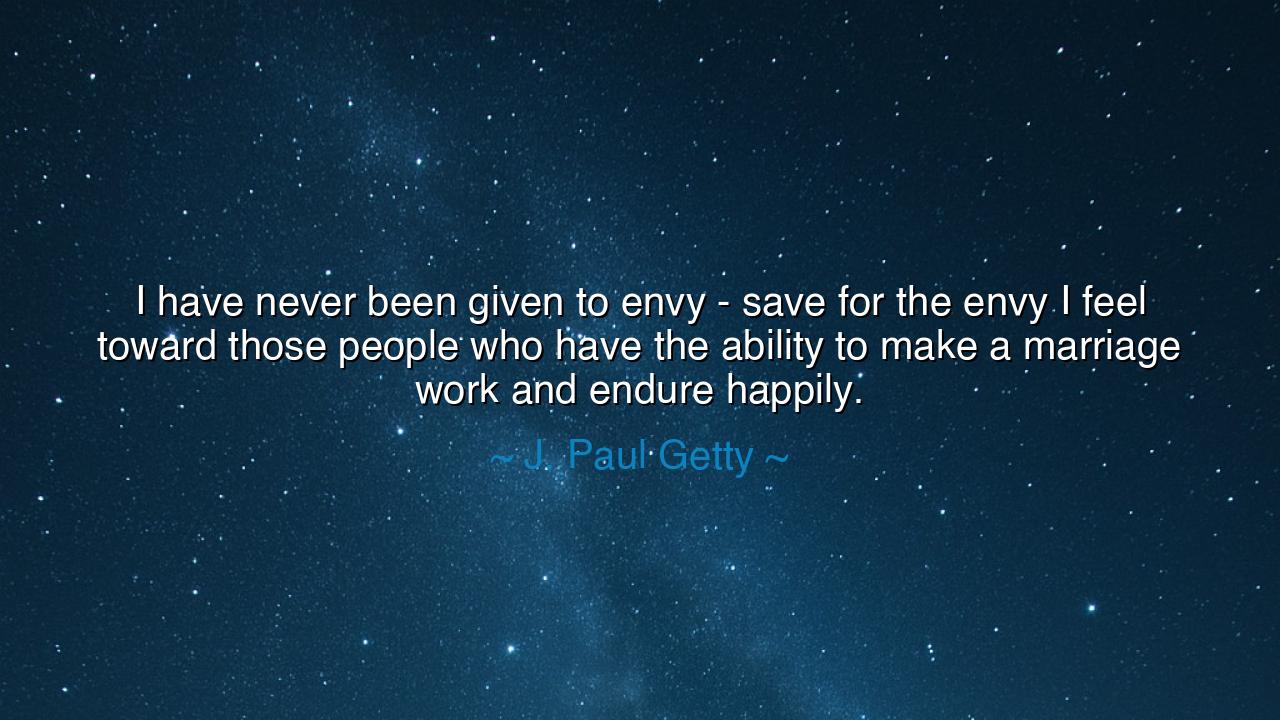
I have never been given to envy - save for the envy I feel toward
I have never been given to envy - save for the envy I feel toward those people who have the ability to make a marriage work and endure happily.






The words of J. Paul Getty — “I have never been given to envy — save for the envy I feel toward those people who have the ability to make a marriage work and endure happily.” — emerge from the depths of wealth, power, and solitude. Spoken by one of the richest men of the twentieth century, they reveal not pride, but longing — the wistful confession of a man who, though he conquered the world of commerce, could not master the simple, sacred art of companionship. In these words lies a profound paradox: that fortune cannot purchase fulfillment, and that the true measure of success is not empire or gold, but the quiet endurance of love. Getty’s voice, so often associated with ambition, here becomes that of a philosopher, humbled by the mystery of human connection.
J. Paul Getty, the oil magnate whose name became synonymous with immense wealth, lived a life of staggering contrast. He built vast enterprises that spanned continents, yet his personal life was marked by disarray and distance. Married and divorced five times, he was often portrayed as cold and calculating — a man who guarded his fortune as fiercely as others guard their hearts. Yet in this quote, the mask of the tycoon falls away. What remains is a man aware of his own limits, acknowledging with almost childlike sincerity that the one treasure he could not claim was the enduring happiness of a lasting marriage. His envy was not born of greed, but of admiration — admiration for those who could achieve in love what he could not achieve in life.
The meaning of Getty’s words stretches far beyond the personal. It is a reflection on the fragility of love and the immense labor it requires to endure. In a world obsessed with external success, we often forget that the heart demands a different kind of wisdom — patience, humility, and the courage to grow alongside another soul. Getty, who lived in a realm of contracts and calculations, found that these virtues cannot be measured, bought, or traded. A marriage that “endures happily” is not sustained by fortune or intellect, but by mutual sacrifice — by the daily choice to forgive, to listen, to care. Those who possess that ability, he suggests, hold a mastery greater than any business empire, for they have conquered not the markets of men, but the restless tides of the human spirit.
The ancients knew this truth well. In the writings of Marcus Aurelius, the Stoic emperor, we find the same reverence for inner strength over outer triumph. Marcus ruled Rome — the greatest power of his age — yet his writings speak often of tenderness toward his wife, Faustina, despite her flaws. He understood that love, like leadership, required discipline and self-restraint. But even emperors faltered where the heart was concerned, for passion and pride are unruly gods. Getty’s envy mirrors the ancient lament: that it is easier to build cities than to sustain affection; easier to command armies than to nurture peace within the home.
History offers us examples both tragic and triumphant. Consider Eleanor and Franklin D. Roosevelt, whose marriage endured through political storms and personal betrayals. Though their love changed shape — becoming a bond of purpose rather than passion — it survived because both partners learned to honor something greater than themselves. Their union became a symbol of endurance, not perfection. In contrast, Getty’s life reminds us that the lack of such endurance, even amid riches, leaves the soul impoverished. To envy those who “make marriage work” is, in truth, to envy those who have discovered how to build something permanent in a world built on change.
There is a deep wisdom in Getty’s humility. He reminds us that wealth and intelligence do not guarantee happiness, for the heart obeys no logic but its own. His envy is not bitterness — it is reverence for the rare alchemy that turns affection into companionship, and passion into peace. He recognizes that love’s endurance is not luck but labor, not fantasy but faith. To “make a marriage work” is to live every day as an act of renewal — to choose love not for what it gives, but for what it requires: patience, generosity, and the courage to forgive. These virtues, though simple, are harder to acquire than all the riches of empires.
And so, my children, take heed of this teaching: do not measure your success by what the world admires. You may possess houses of marble and vaults of gold, yet if you cannot share them with a heart that understands you, you stand in emptiness. Learn instead the craft that Getty envied — the art of nurturing love through storms and seasons. Speak with gentleness, even when anger burns; listen with empathy, even when you feel unseen. Remember that love is not sustained by grand gestures but by small, steadfast acts of care.
Thus, the wisdom of J. Paul Getty endures beyond his wealth. His envy is a mirror to every heart that seeks meaning beyond possession. In the end, it is not the mogul who is richest, but the one who can walk beside another through the years, unbroken in affection, unwavering in faith. For the greatest fortune a soul may hold is not counted in currency, but in companionship — the kind of wealth that, once gained, even death cannot take away.






AAdministratorAdministrator
Welcome, honored guests. Please leave a comment, we will respond soon